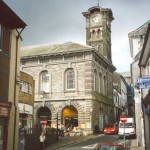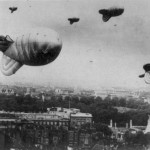Thursday Thought: One way to deal with Bullying
Another memoir while memory lasts
I feel embarrassingly left out of conversations about unhappy childhoods and their devastating effects upon our adult psychology. I was the youngest in the family, the only boy spoiled rotten by three mothers, if you count my two adoring older sisters as sharing the maternal role. It was a perfect existence. I have no complaints.
There was one upsetting moment when I was four years old. I overheard my eldest sister Pam making a comment about me to our mother as she was helping her in the kitchen. It sounded disparaging and I stormed indignantly to my own defense.
“I am NOT a kizzling doney child!”
My sister reassured me. “No, no, I was just saying to Mummy that with Pat and me being ten and thirteen years older than you, you are equivalent to an only child.”
Well, what was so bad about that? I got lots of attention, and I had playmates close to my age all around. And I had just spent three months in Copenhagen alone with my mother with her undivided attention except when my father took us over and then came to bring us back. The stormy North Sea crossing from Harwich was horrible and my mother and I were seasick most of the way. However, she had to go to Denmark for specialized medical treatment that was not available in England. She had contracted lupus though careless dental surgery. The dangerous infection was in her jawbone and face and could only be eradicated with cauterization. The Danish doctors were kind as well as skilled and saw her through a grueling experience that would end her beauty, although that loss was much more important to her than to us children or our father.
The food in Denmark was disgusting and smelled foreign. I so looked forward to jam and clotted cream and the saffron bun my father promised to bring when he came to bring us back. And there was a young woman in the rooms next to ours where we were staying. She was an aspiring soprano and she practiced shrill scales and arpeggios hour after hour, day after day. My father telephoned and said I should just stuff an onion in her mouth.
Anyway, after we got home to England my parents decided it was high time for me to go to school. I was close to the compulsory school age of five. So at the start of the new school year in September my mother dragged me on the short walk, about a mile, to the small private school in the center of Liskeard.
Fortunately, we didn’t encounter any of my friends on the way. It would have been really embarrassing. You see, actually the full name of the school was Highwood House School for Girls. My sisters had gone there but I did not want to go. A few boys were admitted to kindergarten and thereafter until they were old enough at ten to go on to the secondary school. Older pupils were girls only. I imagined that only soppy boys went to the school and I did not want to be perceived as one of them. However, I was soon to learn that there was a nasty little tough among my schoolmates.
Memories of the school were among the many brought back during my book tour of Cornwall in July. I gave a talk at the Liskeard Book Shop. It is on Barras Street, just a couple of buildings along from Highwood House. John Rapson, a nephew of the headmistress was in the audience and shared professional photographs he had taken of me as a boy.
Miss Rapson was a precise no-nonsense teacher as was her companion Miss Wilkes. The school was in their house. They were both formidable disciplinarians with acerbic tongues. To start the day each of us had fifteen conduct marks, which were whittled away with each passing infraction of studiousness or behavior. In the first form we sat in rows on long benches attached to long wooden desks. There were grooves along the top to stop our pens and pencils rolling down and ink wells at every place. There were individual lids so that we could keep our pencil boxes and exercise books and pen wipers and spare nibs inside our own desks. There were still one or two slates in the room but Miss Rapson had decided to get up to date and provide her pupils with exercise books and paper.
I was a good little boy and hated getting into trouble. I usually sailed through the day with conduct marks intact. I paid attention in class and avoided the sarcastic scolding that some pupils endured. I memorized the multiplication tables, right up to twelve times. My sisters helped me practice spelling so I did well in the daily tests and quickly learned to read. My handwriting was not very tidy and was abundantly decorated with ink blots, like my fingers, but I was careful to make the loops upright. I hated drawing and painting and had trouble not going over the lines. Fortunately, we boys were not made to do needlework like the girls.
Every day there was recess. When it was really wet and cold, Miss Wilkes would make us play singing and rhyming action games indoors. I remember the one about the bells of London’s churches. “Oranges and lemons, Say the bells of St. Clement’s. You owe me five farthings, Say the bells of St. Martin’s. When will you pay me? Say the bells of Old Bailey. When I grow rich, Say the bells of Shoreditch.”
Pamela Raymont kept choosing me as a partner, which was pretty embarrassing and I avoided her. She was a farmer’s daughter and lived in the country. She was very pretty with blonde hair, blue eyes and a beautiful pink and white complexion. After we both went to the secondary school she really blossomed and I wished I had paid her more attention but by then it was too late. Vivian Danners was the son of one of the local butchers and he got pretty rough when it came to the bit about “Along came a chopper to chop off her head!”
On fine days recess was outside. There was a big upper playground for the girls and a smaller playground for the boys. Vivian Danners always wanted to play rough games, like fighting, and wrestling. He was a lot stronger than me and always beat me. I did not like that but there wasn’t much I could do about it. I tried to avoid him but he always found me. You couldn’t tell Miss Wilkes because that would be sneaking. My father said I should punch him on the jaw but I was afraid he would just punch me back harder. I would think of something eventually.
Most of the time school was pretty enjoyable. One term my sister Pat came to teach part time while she was waiting to start her training as a physiotherapist. She tried to be strict with me so that the other children would not think I was her favorite, but she could not help being pretty nice. And once every term there was a special treat.
The whole school was invited into the private part of the house to sit in the big front hall where Miss Rapson would show us her museum. Her father had been a Methodist missionary in Africa and she would tell us lots of stories about converting the heathen and persuading them to give up being cannibals. I thought I would like to be a missionary but then I learned it was pretty dangerous and very poorly paid. Anyway, Miss Rapson had a marvelous collection of things her father had brought back from Africa and we loved looking at them and even holding them. There were masks, costumes, sculptures, primitive art, assegais (those sharp short stabbing spears), shields made of rhinoceros hide, knives, elephants’ tusks, stuffed animal heads, beads, pots, and letters and old photographs about the missionaries.
We learned a lot at Highwood House. We certainly got a solid grounding in the three Rs. We learned manners and good behavior. We learned about the world and developed an interest in geography. Those were innocent days. It never occurred to us to wonder exactly what were the living arrangements for these two spinster ladies living all their lives in the same house. Our parents never brought up the subject. We just assumed it was convenient and perfectly natural. Sometimes when we are nostalgic for the good old days it is that kind of innocence that I most miss.
There is one more memory. Vivian Danners went to the secondary school at the same time as me. We were not in the same form but we had recess at the same time. He was still rough and strong and liked wrestling and fighting and I was still unable to avoid him. But then the war started. The whole British Empire came to the aid of the home country. My father had cousins in New Zealand and George Rawstron came and stayed with us for a few days. He was in the RNZFAA, the Royal New Zealand Fleet Air Arm, and I think he had come over on convoy escort duty.
George had just taken a course in unarmed combat. He gave me the booklet and taught me how to knock a man down with two fingers, but you had to be careful if you didn’t want to kill him. We practiced until I could even knock George down. The next day at recess Vivian Danners grabbed me with a hard squeeze around my neck. I tried the two finger trick. It worked! Vivian Danners lay in a heap at my feet. He never bullied me again.
Richard Hoskin © 2015




















